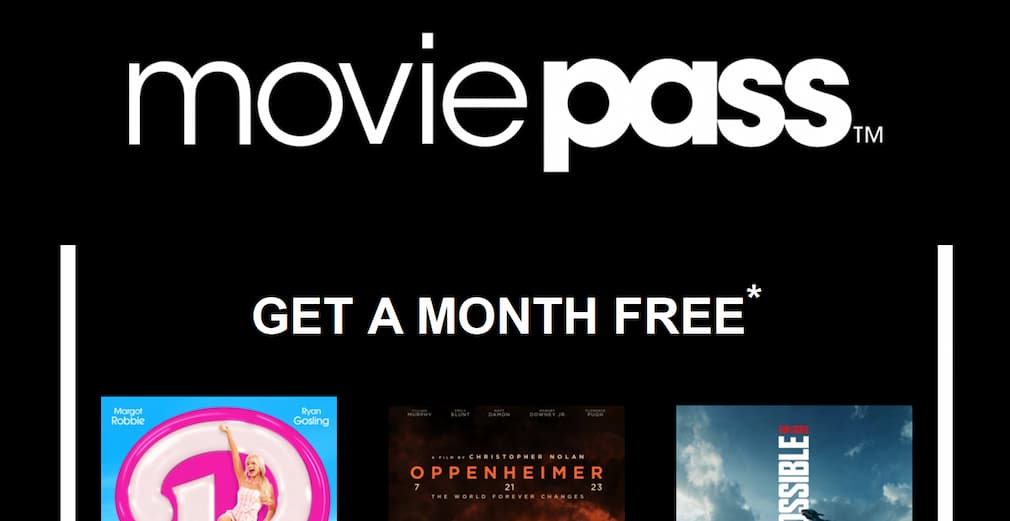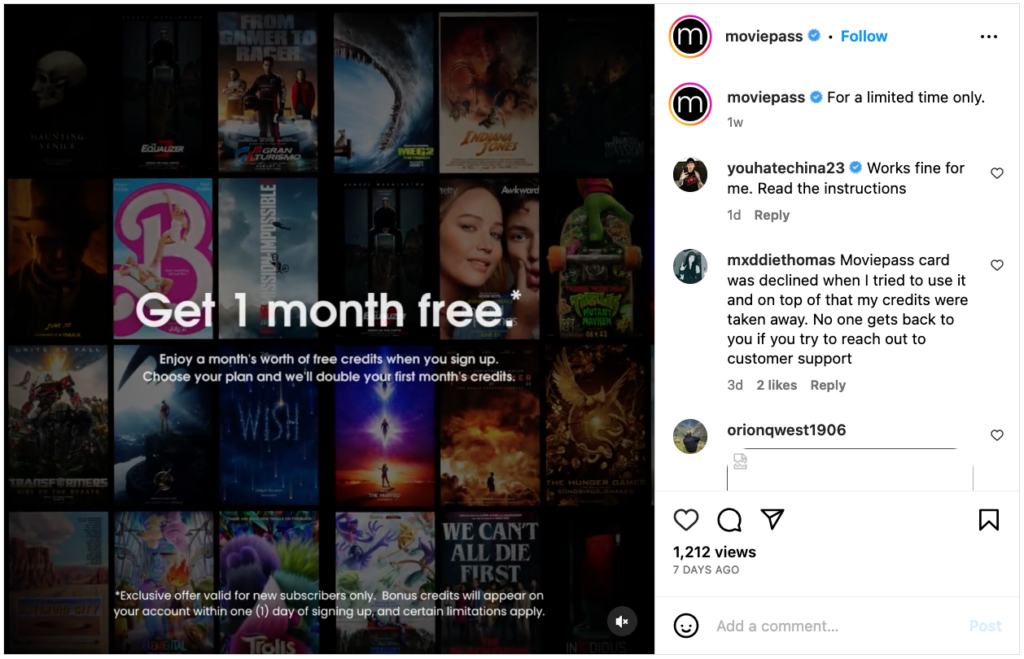
MoviePass: ‘Get a Month Free’
The movie ticket subscription service is back. Unfortunately, so too are the deceptive ads.

After filing for bankruptcy and then settling federal charges that it took steps to block subscribers from using its ticket service as advertised by preventing them from going to “unlimited movies,” MoviePass is back.
Unfortunately, an email from the company’s marketing department sent to a TINA.org reader last week doesn’t inspire much confidence that it has completely moved on from the deceptive tactics that got it in trouble with the FTC in 2021.
While the email prominently advertises “GET A MONTH FREE,” that isn’t the actual offer, i.e., consumers who sign up don’t get a month where they don’t have to pay for the service. Rather, they get “a month’s worth of free credits” under MoviePass’ new credits-based system.
MoviePass discloses these terms in the email, but it does so below “GET A MONTH FREE” and a button to “CLAIM NOW!” and in a smaller size font than the all-caps prompts.
MoviePass also advertises the “1 month free” offer on its Instagram and Facebook accounts while only revealing in the fine print of posts that the offer is really just for “free credits.”
In its 2021 complaint the FTC alleged that MoviePass violated the FTC Act, as well as the Restore Online Shoppers’ Confidence Act (ROSCA), which, among other things, requires that companies that market negative-option offers clearly and conspicuously disclose “all material terms of the transaction before obtaining the consumer’s billing information.” Before the settlement was finalized, TINA.org filed a comment with the FTC supporting its proposed consent agreement with MoviePass and its broad interpretation of ROSCA as requiring the disclosure of material terms even if they pertain to the underlying product or service being sold as opposed to just the mechanics of the negative-option transaction.
An attempt to win back a former subscriber’s business?
Our reader said he was a subscriber before MoviePass filed for bankruptcy in January 2020 (which is how, he assumes, the company got his email address). He said he “was going to sign up for one month to try the service, but decided to not sign up when [he] saw their actual ‘one month free’ offer.”
According to the FTC, when making “free” offers, all terms, conditions and obligations of the offer “should be set forth clearly and conspicuously at the outset of the offer so as to leave no reasonable probability that the terms of the offer might be misunderstood.” In determining whether a disclosure is “clear and conspicuous,” the FTC will consider a number of factors, including the prominence of the disclosure, whether it is unavoidable, and whether other parts of the ad distract attention from the disclosure. The FTC also advises marketers to “[t]ake account of the various devices and platforms consumers may use to view advertising and any corresponding disclosure.”

In response to a request for comment, MoviePass didn’t provide the most satisfying answer to why the email our reader received implies that consumers can get a free month of service when that is not the case.
We had looked at what other companies in the entertainment industry were offering for consumer incentives and we have been A/B testing several different offers that are most attractive to customers.
Find more of our coverage on MoviePass here.
Our Ad Alerts are not just about false and deceptive marketing issues, but may also be about ads that, although not necessarily deceptive, should be viewed with caution. Ad Alerts can also be about single issues and may not include a comprehensive list of all marketing issues relating to the brand discussed.
You Might Be Interested In

The ‘Buy’ Button in the iTunes Store
When you don’t own what you buy.

The Kids Guide to Fighting Socialism
“Free” guide harbors future charges that aren’t disclosed in a frightening email to parents and grandparents.

Slotomania
“Free” mobile slot game isn’t free for long.
